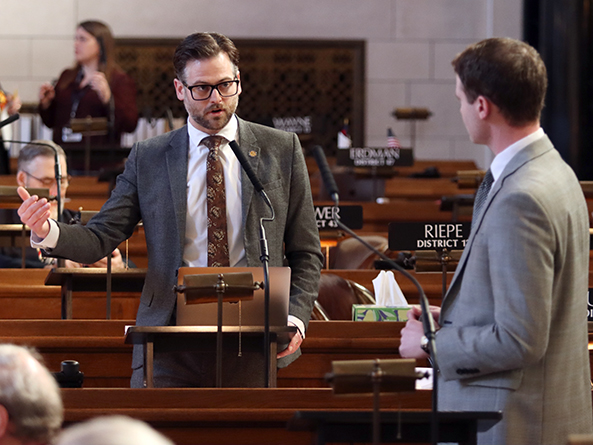Medicaid prenatal program amended, advanced
Lawmakers gave first-round approval Feb. 13 to a bill that seeks to provide support for low-income Nebraska mothers who are at risk for adverse birth outcomes.

LB857, as introduced by Lincoln Sen. George Dungan, would create the Nebraska Prenatal Plus Program to cover the cost of prenatal and postpartum services for at-risk mothers. The bill defines an at-risk mother as a woman who is eligible for Medicaid or the Children’s Health Insurance Program who is pregnant or in the postpartum period and determined by a health care provider to be at risk of having a negative maternal or infant health outcome.
A Health and Human Services Committee amendment, adopted 45-0, replaced the bill. The amendment would limit the program to prenatal services for Medicaid recipients. The state Department of Health and Human Services would be responsible for filing a state plan amendment or waiver to authorize the program no later than Oct. 1, 2024.
The department would be required to submit an annual report to the Legislature beginning Dec. 15, 2024, regarding the number of mothers served by the program, services offered and birth outcomes. The amendment also would add funding for the program as an authorized use of the Medicaid Managed Care Excess Profit Fund.
Services eligible for reimbursement under the program would include nutritional counseling, psychosocial counseling and support, general client education and health promotion, breastfeeding support and targeted case management.
Nebraska Medicaid currently offers a “fairly robust” package of prenatal services, Dungan said, but certain services that are especially important for at-risk mothers, such as those outlined in the bill, are not covered. He said LB857 would expand coverage while also ensuring that current services continue to be reimbursed.
Dungan said a 2001 study conducted on a similar program in Colorado found significant cost savings to the state’s Medicaid program and an immediate increase in birth weights among mothers on the program. Implementation of the Prenatal Plus Program in Colorado showed that for every dollar invested in the program, there was a Medicaid savings of $2.48, he said.
“We know that if we [fund] these upstream investments, there’s not the same downstream negative effects,” Dungan said.
Elmwood Sen. Robert Clements introduced an amendment to the committee amendment to sunset the program on June 30, 2028. He said the change would allow future legislators to evaluate the success of the program before allocating continued funding.
“When a new program starts, I think it should be a pilot program,” Clements said. “After four years … we should be able to have an idea if [the program] is successful.”
Speaking in support of the bill and both amendments, Ralston Sen. Merv Riepe said the program would help promote healthy lifestyles for expectant mothers.
Seward Sen. Jana Hughes spoke in support of LB857 and the committee amendment, but expressed concerns that the proposed sunset date would not allow enough time to fully implement the program and see its true impact.
There are approximately 2,600 preterm births in Nebraska every year, Hughes said, and over half of those births occur in families who would qualify for assistance under the Prenatal Plus Program.
“Why would we only want to help mothers and babies at risk for a couple of years and then take it away?” Hughes asked. “We can spend a smaller amount of money now and prevent adverse outcomes that can have a lifetime of consequences [for] kids as they grow.”
Senators voted 25-15 to adopt the Clements amendment and advanced LB857 to select file on a 45-0 vote.


